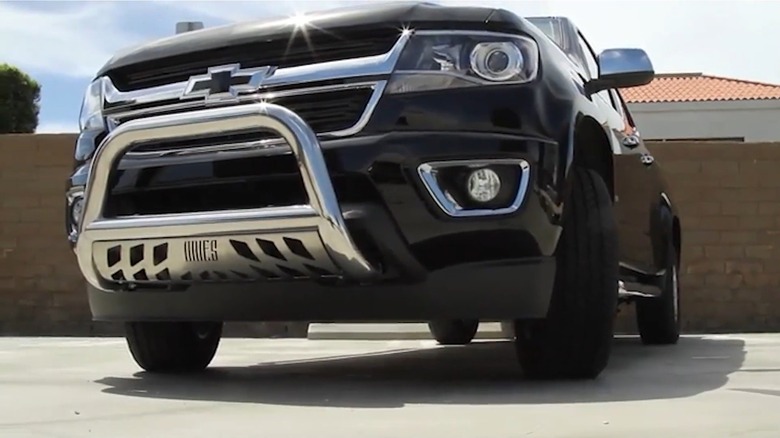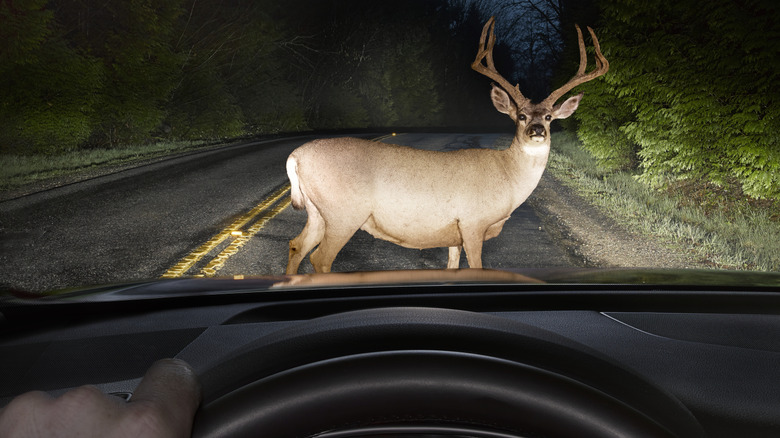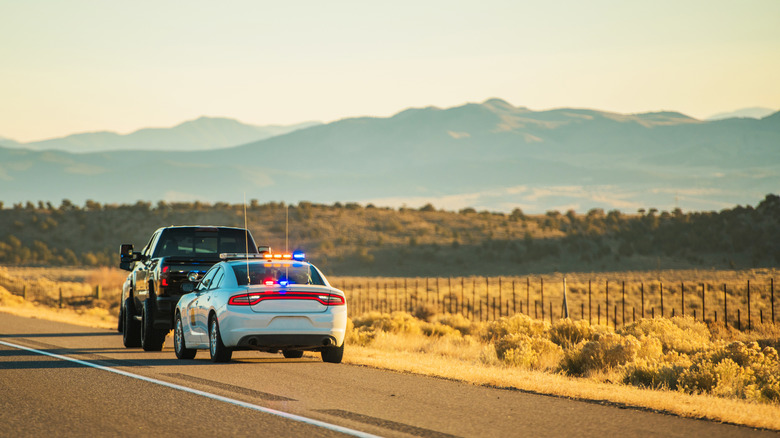What Are Truck Bull Bars Made For & Are They Legal To Use In The US?
We may receive a commission on purchases made from links.
There is a wide array of aftermarket products that can enhance your pickup, from accessories that'll transform your truck bed to must-have truck interior accessories for maximum comfort. However, one of the most popular add-ons is something called a bull bar. Made from steel or aluminum, a bull bar is a thick series of curved tubing that's installed to the frame and positioned over the front bumper.
While sometimes the terms are used interchangeably, a bull bar is actually different from a grille guard in that its shaped differently and is smaller, mainly providing protection to the bumper, not the actual front grille or headlights like a grille guard.
This modification isn't exclusive to trucks either. Police cars have bull bars in front that come in handy in a variety of scenarios. For example, when law enforcement is required to disable a moving vehicle, the bull bar protects the cruiser during a tactical PIT maneuver. Speaking of police, it isn't generally illegal to install bull bars on your truck; however, it might depend on your state or local municipality.
Why you may or may not want to add a bull bar to your truck
While many truck owners appreciate the look of this aftermarket part, the purpose of a bull bar goes beyond aesthetics, offering a greater degree of protection from front collisions. On average, around 2.1 million vehicle crashes involving deer occur every year in the U.S., per Car And Driver.
Not only can these incidents involve severe injuries and death (both for the animal and the occupants of the vehicle), but it can cause devastating damage to a truck's front end. In the case of hitting a deer, not only is the body of the truck crumpled, but it can cause damage to vital engine systems, causing leaks or failures.
Bull bars restrict the extent of damage to your truck's front end in a crash, but they also do have a few downsides worth considering. For example, since bull bars are made from metal, they add a fair bit of weight to your truck. In fact, robust bull bars that include full-width bumper replacements, winch fitting, and integrated lights can add upward of 250 pounds to your pickup's front. This could alter performance by reducing fuel economy and towing capacity, among other concerns.
Will a bull bar result in a ticket?
In terms of legality, there are no federal laws prohibiting the installation of a bull bar. However, some state laws can get very particular about how far above the ground the bumper sits (a bull bar is attached below the bumper so it can affect this measurement) as well as any modification that blocks the front license plate from view.
For example, New York law states that a bumper or device has to be a minimum of 16 inches off the ground but can't be higher than 30 inches with no occupants. This wouldn't be an issue with the typical bull bar, but if you went with something extra big for style points, it might get you in trouble (at least in New York). In New York City, it's illegal to put a bull bar on taxis or limousine's, due to the concerns about pedestrian safety.
Not every state requires a front license plate, but there are 29 states that do. Many bull bar designs might block the plate, which would result in a citation. Fortunately, there are several products like the Aootf Front License Plate Bracket Holder, which allows you to relocate the plate to a visible area. The best practice if you want to install a bull bar or any body modification on your truck, is to check with your local city and state motor vehicle laws to confirm you won't get ticketed.


